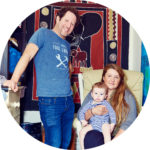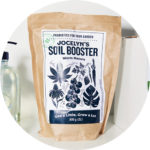
The Queen of Green
This woman has rejected plastics, packaging and other landfill fodder in pursuit of a low-impact lifestyle
Who she is: Meera Jain, 35, an elementary school teacher
Where she lives: North York
Zero-waster since: March 2018
Monthly waste: Roughly half a grocery bag
Your inspiration to pursue a zero-waste lifestyle:
I have always been an environmentally conscious person. Some friends from Australia visited me, taught me all about their zero-waste ways and encouraged me to watch the documentary A Plastic Ocean to educate myself. After that, there was no turning back.
The hardest part of going zero waste:
Inconvenience. Grocery shopping, getting a coffee and clothing my children all take a little more effort, but it’s all worth it.
Three items that are banned in your home:
I try not to ban anything, but we avoid disposable coffee cups, plastic produce bags and black plastic.
Three items that you own a lot of:
About 25 reusable produce bags, 50 glass jars and a lot of second-hand toys—please don’t ask me how many. Pretty much anything we buy our two children is gently used.

Items you always carry with you:
A reusable bag, a travel fork and a travel mug.
One guilty pleasure that you can’t give up:
Minty chewing gum! No one wants their teacher to have coffee breath. I have tried some biodegradable ones with limited success.
Product or service that you most wish was available waste-free in Toronto:
I wish it was a little more commonplace for restaurants in Toronto to accept personal containers for take out. I’m working on that one restaurant at a time.
The sustainable habit you’re proudest of:
Transitioning our family to a plant-based diet. I was raised as a vegetarian and have been vegan for almost a year now. My husband and children are vegetarian.
Your most ingenious zero-waste life hack:
Homemade deodorant. I make it using coconut oil, baking soda, arrowroot starch and essential oils. I can buy all the ingredients in bulk and it actually works.
Where you buy groceries, and how you store them:
I buy my perishables at a regular chain grocery store. For dried goods, I go to Bulk Barn and use my own containers. I store bread in a reusable and washable linen bag and then to keep it more airtight, I wrap that in a plastic bag, which I reuse. I try to prepare veggies so that they last, which means cutting up and storing carrots and celery in water. I then use the water for my plants.
Where you buy toiletries:
I buy all my toiletries in bulk from Bare Market, Eco and Amour, or Green and Frugal. They are all stored in glass jars I bring with me. I also make my own toiletries from raw ingredients.
Where you buy clothes:
We buy secondhand clothes almost exclusively. For the kids, we love Once Upon a Child and a cute consignment store called Extoggery. We also favour sustainable clothing companies when possible.
Products you make at home:
Deodorant, body lotion, toothpaste, face wash, all-purpose cleaner and a whole bunch of snacks that are difficult to get waste-free, like granola bars and crackers.
Reusable toilet paper—yea or nay:
I am not opposed to it, but we currently use recycled, plastic-free toilet paper. When my youngest daughter was in diapers, we used reusable wipes for number ones.
Main modes of transportation:
My hybrid, my bike and my feet.
How often you drive:
Almost every day. I have made a goal to rely on public transit more this year, but with two separate drop-offs, a very busy husband and my own job and errands, it can be difficult.
How often you fly:
More often than I would like. I would love to be more like Greta Thunberg and rely on public transit and boats, but for various reasons, this isn’t practical most of the time. I am in the position where I can pay for carbon offsets, which makes me feel a little less guilty. I also try decreasing how far we travel for our trips.
How much waste do you produce in a typical month:
I have never measured, but we’ve gotten rid of all our garbage bins except for one. The rest have become compost bins. We might fill one black garbage bag every six to nine months.

Who is your zero hero:
At the risk of sounding cliché, Greta Thunberg. She has cultivated a beautiful movement and empowered people all around the world. She is not scared to speak up for what she believes in and is strong enough to take criticism from the president of the United States.
Best zero-waste tip for child care:
Carry a snack in a reusable container wherever you go—they always want one. The credo that my husband and I live by is that it is our job to guide our children but not to make their decisions for them. We try not to force them to do anything, but rather model the kind of lifestyle that encourages thinking about our environment in the everyday decisions we make.
How often do you…
Use AC or heating: Pretty much every day, but we try to reduce/increase the temperature by one or two degrees from what we might prefer.
Eat out: Once or twice a week. We always bring reusable containers for leftovers.
Use the dishwasher: Every other night.
Do laundry: Four loads every other night.
On a scale of 1 to Greta Thunberg, your sustainability score:
6.5. I have made some great gains that I am very proud of, but I am very aware that I have a lot of work to do. Could I be doing more? Absolutely! Every day we strive to be a little better than the last.
The Green Guide

Part 1: The sustainability sisters—Toni and Lin Sappong, zero-wasters since March 2018

Part 2: The diaper warriors—Ryan Dyment and Emily Hunter, zero-wasters since January 2015

Part 3: The queen of green—Meera Jain, zero-waster since March 2018

Part 4: A sustainable sanctuary in Leslieville

Part 5: A lakeside eco-retreat

Part 6: A natural oasis in Midtown

Part 7: How one super turned his building into a miraculously low-waste condo

Part 8: Incredible bulk—four packaging-free shops

Part 9: Supernova Ballroom—the low-waste cocktail bar

Part 10: “I went green—maybe a little too green“

Part 11: The green shopping guide—guilt-free goodies for climate-conscious consumers
This story originally appeared in the March 2020 issue of Toronto Life magazine. To subscribe, for just $29.95 a year, click here.





